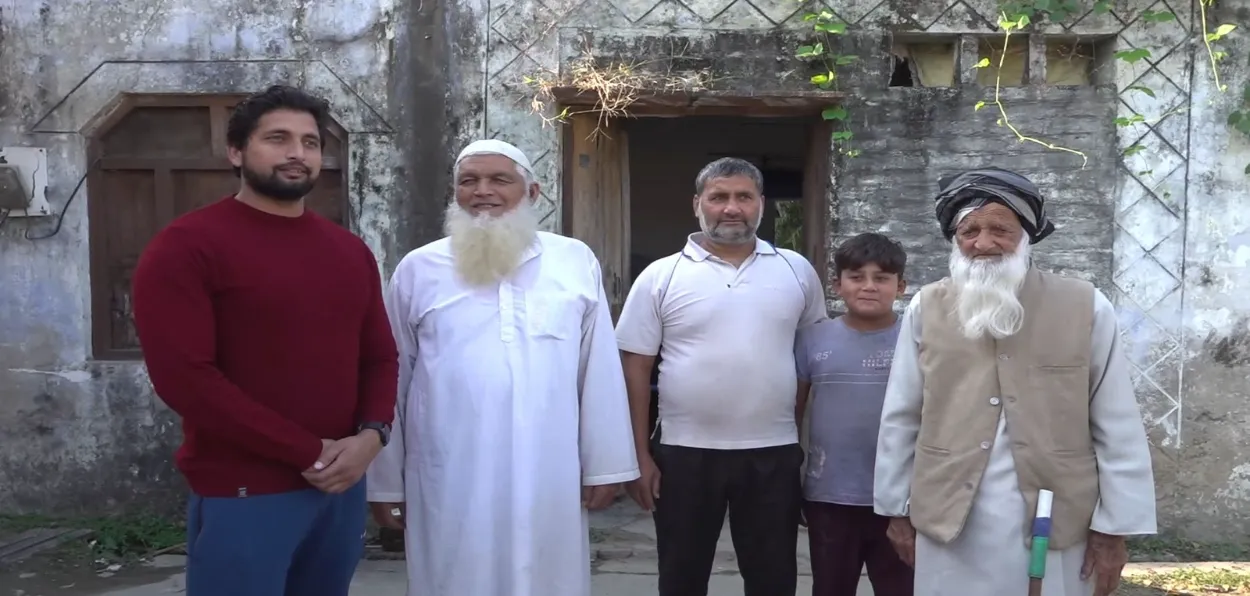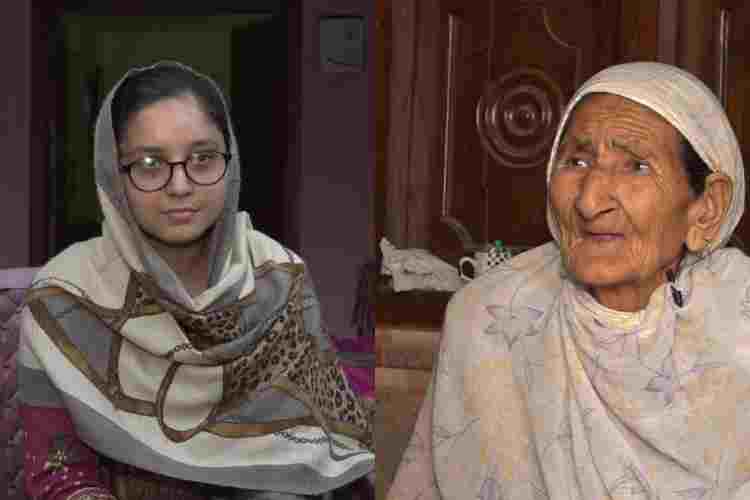
Atir Khan/Haibatpur (UP)
Almost 40 kilometers from the banks of the Ganga near Garhmukteshwar is located in an idyllic village of Haibatpur- a settlement dominated by the Pathans. It has been an example of peaceful and prosperous living for centuries in Uttar Pradesh.
Lush farms flank the approach to the village barely a few hundred meters away from National Highway 24. Ripe sugarcane fields are abuzz with the harvest activities usual around this time of the year. The smell of cow dung manure in the fields is in the air too and makes one aware of being in the village.
Cattle, roosters, and goats grazing freely and fearlessly in the surroundings give a rustic feel. Girls in neat uniforms with school bags on their backs are seen pedaling their bicycles to their schools.
Entrance to Haibatpur village
Over the years roads and houses have become pucca but the air is still light and breathable. It is this air that has seen 106-year-old Alauddin Khan live a long life. “I walk almost one km from my house to the village mosque to offer namaaz five times a day,’’ he says with a sense of achievement.
Alauddin wears a turban and has a long grey beard, with age wrinkles on his face and hands have become prominent. He has a childlike innocence on his face. A wooden stick is all he needs for his unrestricted movement in the village.
“People in the village are happy. We get along quite well with the Hindu Jats of the neighbouring villages. We are proud of our tradition they (Hindus) attend the social gatherings in our village, and we return the courtesies in 50 villages inhabited by the Jats. That’s why there have been no conflicts between the two religious communities ever. We have strong ties with them,’’ he says.
Mustard crop in full bloom in Haibatpur
Deep into the village, at an intersection on a narrow road, a group of old Hindu and Muslim village folk are huddled in a circle. On a closer look, they are seen playing a game with pebbles in their hands. The game is called Baghibagh.
As per the folklore, the village was inhabited by five Pathan brothers, who came to India a long time ago. Those five brothers then invited Hindu friends to settle in the village. No wonder the Pathan village is surrounded by Jat habitations.
“We are hard-working people, and enjoy village life to the fullest,” says 75-year-old Zahid Khan, as he leans back on a chair with much satisfaction. He appears to be a distinguished farmer, who has had his innings and is now enjoying a retired life as his sons take over his work.
Zahid Khan
“Most of the people in the village are related to each other,” he adds. Some 1500 voters of the village are the lineage of five Pathan ancestors. Inter-marriage in the community has resulted in close-knit family”.
The men in the village are agriculturists owning vast tracts of land, while the young generation is now becoming more interested in business.
“I own a banquet hall in Joya and run three brick kilns. Allah has been kind to us; our business is doing good,” says young Asim Khan. He has two little daughters, whom he wants to give quality education.
The women folk are quite conscious about the need for education. 96-year-old Bano Begum is an inspiration for all the women. She is a fountainhead of rustic wisdom.
 Rushda and Bano Begum, ex-pradhan of Haibatpur
Rushda and Bano Begum, ex-pradhan of Haibatpur
In her younger days, Bano Begum has served as the pradhan of the village for six years. Her authority remains intact even today. She is sitting straight on a charpoy with a rosary in her hands. A firm believer in girls’ education, Bano Begum inspires everyone and is always surrounded by affectionate children.
Shazia, a homemaker and a relative of bano Begum says, “Our village has been very fortunate. Many girls are doing professional courses. Some of them are even doing clothes business.”
Her young niece Rushda is pursuing a B Pharma diploma course from a nearby private institute. “I wish to start a chemist shop after finishing my studies, she says smilingly.
Rushda is Fauji Khan’s daughter. The latter served in the Indian Army for several years. That’s how he got his nickname. He has returned to farming and other businesses. He enjoys respect and goodwill in the area.
.jpg) Residents of Haibatpur - Asim Khan, Ifrahim Khan and Fauji Khan
Residents of Haibatpur - Asim Khan, Ifrahim Khan and Fauji Khan
He says, “There has been significant development in the area during the past seven years. Good roads and highways have ensured better connectivity. The people of the village get all the benefits of the government schemes.”
He adds, “The village is so peaceful that there is no need for anyone to file any FIR with the police. We settle our disputes locally.”
Young men in the village are interested in sports. “Wrestling makes me feel good. It helps my body and mind stay fit, and it gives me confidence,” says young Ifrahim Khan. He grapples with other young wrestlers of the village for hours every day. The villagers are in the habit of eating at home only, they never eat outside to stay fit. However, they love homemade mango and other pickles.
Despite belonging to a prosperous village, the young men here have an urge to serve the nation. Many have joined the armed forces. “I have completed post-graduation in humanities. Now I am trying to join the Army,” says Aabad Khan. “Yeh hamara junoon hai; humarey liye fakr ki baathai” (it is my obsession and a matter of prestige for us), he says.
ALSO READ: Assamese Muslim women in Jajori village weave fairy-tales
A visit to this village is both enchanting and refreshing. It appears Haibatpur has managed to keep itself insulated from the kind of communal polarization prevalent in the world. Irrespective of which political party rules, its people are happy in their simple, healthy, and peaceful living.
